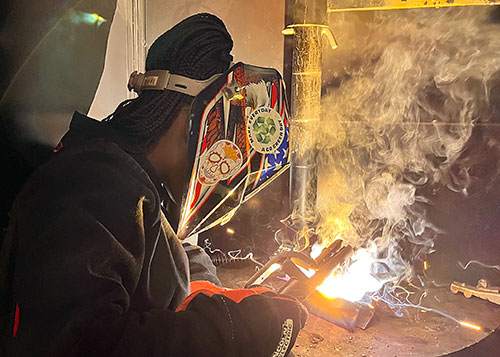BOCES Kicks off National Careers in Construction Month
October is National Careers in Construction Month, and there’s no better place for area high school students to learn the skilled trades than at Capital Region BOCES.
One such student is Watervliet High School senior LaJay York who is forging a career path in the Welding and Metal Fabrication program – and someday may also use those skills to shape minds in a BOCES classroom.
“I wanted to be an ironworker but after coming to BOCES, I may also want to be a teacher like I have had here,” said LaJay.
“Either way, I will be able to weld,” she added. “Laying down the perfect dimes [welding term for a weld] is just an amazing feeling.”

Capital Region BOCES offers pathways to great careers in the construction industry for students through programs such electrical trades, heavy equipment, building trades, network technology, carpentry, welding, and heating, ventilation, air conditioning and refrigeration. Enrollment in these construction-related programs continues to increase with over 400 high school students from more than 24 area school districts in attendance.
Almost every program provides students with professional certifications, many of which are recognized nationwide by contractors and employers. That includes the nearly 100 area businesses and institutions that collaborate regularly with Capital Region BOCES to build the future of the construction industry locally and beyond. Their support is crucial not only to student success, but also to the industry’s future.
Some of the partners supporting Careers in Construction Month include the Associated General Contractors of New York State, National Grid, BBL Construction Services, Finke Equipment Co., STS Steel, Milton CAT, Abele Tractor & Equipment Co., Kamco Supply New England and Penske Corp.
“These partnerships are critical because they allow us to stay on top of what is happening in the industry,” said Nancy Liddle, Capital Region BOCES Managing Program Coordinator-Business & Community Partnerships. “They also help to place students in good jobs that will grow the regional economy and overcome national unemployment trends.”


